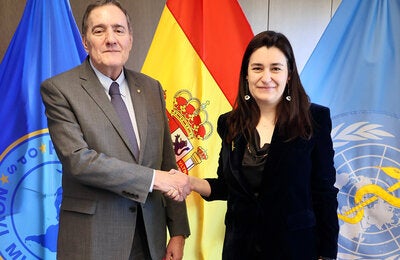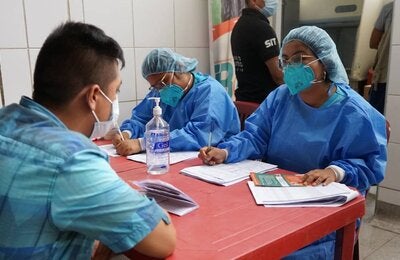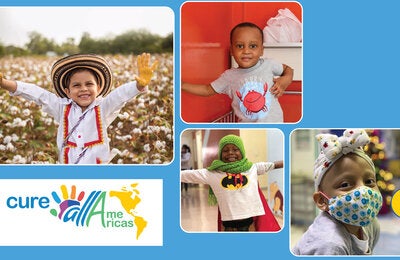

More than one hundred public health experts and stakeholders gathered today in Rio de Janeiro, Brazil, for the First Regional Dengue Symposium, led by the Sabin Vaccine Institute (Sabin), the Dengue Vaccine Initiative (DVI) and the Pan American Health Organization (PAHO), regional office for the Americas of the World Health Organization (WHO).
PAHO/WHO, DVI and Sabin provide an open forum to discuss the future of dengue
RIO DE JANEIRO, BRAZIL — November 3, 2015 — More than one hundred public health experts and stakeholders gathered today in Rio de Janeiro, Brazil, for the First Regional Dengue Symposium, led by the Sabin Vaccine Institute (Sabin), the Dengue Vaccine Initiative (DVI) and the Pan American Health Organization (PAHO), regional office for the Americas of the World Health Organization (WHO).
This inaugural meeting, held Nov. 3-4, 2015, comes as the dengue community prepares for the potential availability of the first-ever vaccines to help combat this pervasive disease. Over the next two days, attendees will share their research and expertise, providing a unique opportunity to promote scientific knowledge for all partners to support governments in their decisions about integrating dengue vaccines with existing dengue prevention and control strategies.
Dengue threatens more than 2.5 billion people in over 100 countries; it is the world's fastest growing vector-borne disease. Dengue causes painful fever with headache, skin rash and debilitating muscle and joint pains. Complications include hemorrhaging, shock, coma or death and frequently require hospitalizations, which cause a major burden on public health systems. This is particularly concerning for low-and middle-income countries, where outbreaks occur often and access to healthcare can be limited or poor. In the Americas alone, costs associated with dengue have been estimated at more than $2 billion, from treatment to productivity loss.
"Despite major efforts by countries over the past decade to prevent dengue and control its mosquito vector, the disease continues to be a significant public health problem in the Americas," said Dr. Jose Luis San Martin, PAHO/WHO regional advisor on dengue. "This symposium will be instrumental in reviewing existing and new approaches to fighting dengue and how, as a region, we can come together to strengthen strategies to prevent and control this disease."
Recent decades have seen important developments in dengue prevention and control strategies, including innovations in vector control mechanisms and mathematical modeling to better understand dengue's burden.
In addition, several vaccine candidates are under development. In 2014, the first Phase III trials for one of these was completed and demonstrated an overall efficacy of 61% in Latin America (57% in Asia). In July of this year, PAHO's Technical Advisory Group on Vaccine-preventable Diseases (TAG) noted the encouraging developments in vaccines for dengue but said there was insufficient evidence to make a recommendation on vaccine introduction at that time. Meanwhile, five other vaccine candidates (all tetravalent intended to protect simultaneously against the four dengue viruses) continue to progress in their clinical trials.
A dengue vaccine is viewed as a valuable additional tool for integrated dengue prevention and control.
"The approach to dengue prevention and control should be evidence-based and reflect country-ownership," said Dr. In-Kyu Yoon, director of DVI. "This meeting will help promote the exchange of lessons among countries in the region. It will continue to lay the groundwork for decision-making about vaccine introduction in the Americas and around the world."
The Regional Dengue Symposium, the first of its kind, organized jointly by PAHO/WHO, the Sabin Vaccine Institute and DVI, will review traditional and new approaches to fighting dengue. It will bring together perspectives from all partners involved: global health experts, public health practitioners and policy makers from dengue-endemic countries in the Americas and representatives of companies developing vector-control technologies and vaccines. The inclusion of stakeholders across sectors and disciplines seeks to strengthen the conversation about the challenges ahead in eliminating dengue.
"This is an exciting time for the global health community — years of on-the-ground implementation experience, improved epidemiology and scientific advances have made progress in dengue vaccine development possible," said Dr. Jon Andrus, Executive Vice President and Director of Advocacy and Education at Sabin. "In combination with current dengue interventions, a vaccine could help us remove dengue as a public health threat worldwide. As we move forward, advocacy for vaccine introduction and improved, integrated solutions in tackling dengue will be critical to ending the needless suffering caused by this preventable disease."
For the symposium's agenda please visit www.denguesymposium.org
###
About PAHO
The Pan American Health Organization, founded in 1902, is the oldest international public health organization in the world. It works with its member countries to improve the health and the quality of life of the people of the Americas. It serves as the Regional Office for the Americas of WHO and is part of the Inter-American system.
About DVI
The Dengue Vaccine Initiative is an independent international consortium that specializes in epidemiology and other research, health economics, policy and advocacy to equip countries with objective information and scientific evidence to fight dengue fever, a widespread mosquito-borne disease which causes an estimated 390 million infections a year in over 120 countries. The Initiative is supported in part by the Bill & Melinda Gates Foundation.
About Sabin
The Sabin Vaccine Institute is a non-profit, 501(c)(3) organization of scientists, researchers and advocates dedicated to reducing needless human suffering from vaccine-preventable and neglected tropical diseases (NTDs). Since its founding in 1993 in honor of Dr. Albert B. Sabin, the developer of the oral polio vaccine, Sabin has been at the forefront of global efforts to eliminate, prevent and cure infectious and neglected tropical diseases.



